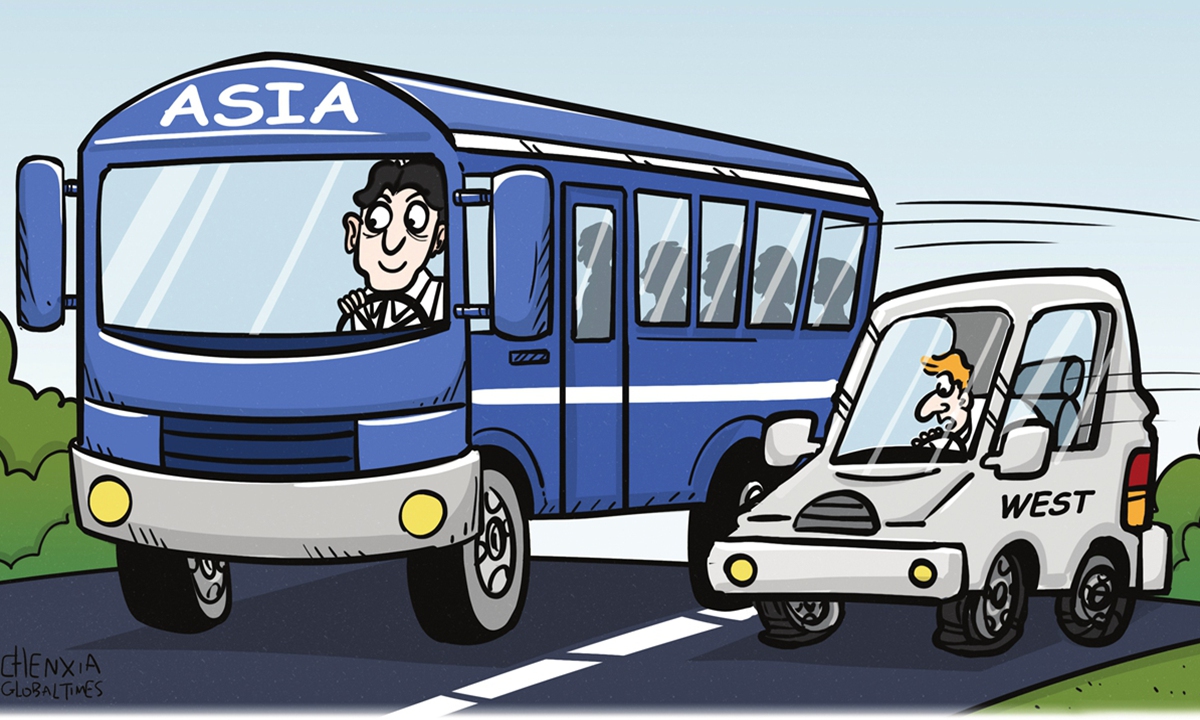
Illustration: Chen Xia/GT
The
recently concluded international meetings - the ASEAN Summit, the G20 Leaders' Summit and the APEC Economic Leaders' Meeting - have once again put Asia in the global spotlight. Asia has become a global geopolitical and economic center. However, peace across the region is facing a growing number of challenges.
Among them, what China should be most vigilant about is that the US is attempting to polarize the international community. In the ongoing conflict between Russia and Ukraine, the Western media repeatedly try to tie China and Russia together, which is an important step of Washington to polarize the world.
Polarization has an extremely negative impact on Asia. Most countries in the region have deep relations with both China and the US. If the two countries can get along well, regional countries will have a sense of security and at the same time secure their development. If China-US relations worsen to what Russia-Europe or US-Russia relations are like today, all Asian countries will become victims. If that occurs, Asia will face a situation similar to what Ukraine is facing now - no security and no development. China shouldn't allow the Ukraine crisis to repeat itself in Asia. Asian security is facing a severe test. As long as China remains rational, it will be difficult for the US to realize its goals.
In the past few years, the US is busy forming cliques not only in Asia, but also other parts of the world by forcing other countries to choose sides. China didn't do this, which helps prevent further division in Asia. The US-advocated exclusive multilateralism, known as "Value-Based Bloc" is in stark contrast to the China-promoted multilateralism that stresses tolerance. China-promoted multilateralism has generated very positive results, and Asian countries have their own judgment of it.
As the biggest country in Asia, China shoulders more responsibility for peace in Asia, and China should help Asian countries master their own destiny. What should China do?
First, as the biggest economy in the region, China should provide more public goods. In the past 40 years, despite competition between China and other major Asian powers such as Japan, this competition has remained benign. The cooperation mechanism of ASEAN Plus Three is a typical example. Although China, Japan and South Korea are far from being united, each has developed good relations with ASEAN. Hence the formation of the ASEAN+3 mechanism.
Second, we must keep our doors open and continue to practice a multilateralism that stresses tolerance. Most Asian countries are open to each other, even more so than countries in other regions. We must keep this degree of openness. Now we are facing US-created blocs based on the so-called values. Such blocs go against globalization. Only regionalization that is built on opening to each other can push forward globalization. As a major power, the opening-up of China itself is the best regional or even international public good.
Third, we must handle relations well with smaller countries. Big countries, including China, India and Japan should be inclusive toward smaller countries. The achievements Asia has made in the past 40 years are greatly related to the inclusiveness of big countries.
Fourth, regarding areas where there is the potential risk of a military clash, we must properly handle relations with the US. US presence in Asia has never ceased. But the US has held a wrong perception toward China, believing that China's aim to solve the South China Sea disputes and the Taiwan question involves squeezing the US out of the Western Pacific and claiming hegemony in the region, which is not the case.
Taiwan is at the heart of China's core interests. The Taiwan question is a matter of national reunification, not a fight for hegemony with the US, as some Americans see it. It also has nothing to do with Western-touted democracy. It is about sovereignty, not administration. In the Taiwan question, China's goal is not to defeat the US, but to achieve national reunification.
In the past, the status of major power was won through wars, such as the British empire, the US and the Soviet Union. But now, whether a country can be defined as a major power depends on whether it has the ability and will to provide enough international public goods to the region and the world. Achieving sustainable rise by providing international public goods is what differentiates China and other major powers in the past. Asian peace can be secured with more international public goods.
The author is professor at the Chinese University of Hong Kong, Shenzhen, and president of The Institute for International Affairs, Qianhai. The article is an excerpt of his speech at the Baichuan Forum - the Second 2022 Symposium of Changes and Evaluation of China's External Environment: How to Achieve Lasting Peace in Asia. [email protected]


